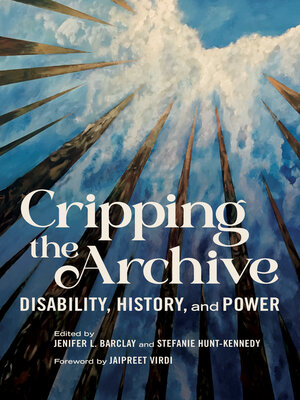Cripping the Archive
ebook ∣ Disability, History, and Power · Disability Histories
By Jenifer L. Barclay

Sign up to save your library
With an OverDrive account, you can save your favorite libraries for at-a-glance information about availability. Find out more about OverDrive accounts.
Find this title in Libby, the library reading app by OverDrive.



Search for a digital library with this title
Title found at these libraries:
| Library Name | Distance |
|---|---|
| Loading... |
Jenifer L. Barclay and Stefanie Hunt-Kennedy edit a collection of interdisciplinary essays that consider how and why physical, sensory, intellectual, and psychological disabilities are underrepresented, erased, or distorted in the historical record. The contributors draw on the methodology and practice of cripping to uncover disability in contested archives and explore ways to build inclusive archives accountable to, and centered on, disabled people and disability justice. Throughout, they show ableness informing the politics of the archive as a physical space, a discriminatory record, and a collection of silences.
An essential contribution to research methods and disability justice, Cripping the Archive offers a blueprint for intersectional and interdisciplinary approaches that bridge disability studies, history, and archival studies.
| Cover Title Copyright Contents Acknowledgments Part I. Uncovering Chapter 1. The Missing Romanian Chapter in Disability History by Radu Harald Dinu Chapter 2. Deafening Architectural Modernism: Reconsidering the Archive of Adolf Loos by Nina Vollenbröker Chapter 3. "Brain of Woman, at 30, Half an Idiot": Recovering Disability Histories from the "Footnotes" of the British Museum Collection by Isabelle Lawrence Chapter 4. Cripping the Convict Archive by Emily Cock Chapter 5. The Feverish Saint: A Queer Crip Encounter with the Public Universal Friend by KJ Cerankowski Part II. Obscuring Chapter 6. Disability, the Modern State, and the Archive in the United States by Audra Jennings Chapter 7. There Are No Invalids in the Archive: Hidden Sources and Ideological Obscurations in the History of International Blind Activism by Maria Cristina Galmarini Chapter 8. Silence and Stigma: How Archival Restrictions Threaten Histories of the Mentally Ill in the United States by Sarah Handley-Cousins Chapter 9. Recovering the Past to Understand the Present: Cripping School Segregation in New York City by Francine Almash and Jan Valle Part III. Decolonizing Chapter 10. Settler Ableism: Indigeneity, Unsettling the Archive, and Accountability in History by Sarah Whitt (Choctaw Nation of Oklahoma), Traci Brynne Voyles, and Susan Burch Chapter 11. Hall of Miracles: Central American Disability Archives by Heather Vrana Chapter 12. Cripping the Settler Archive: Disability in Women's Memoirs of the Indian Service by Jess L. Wilcox Cowing Part IV. De-Centering Chapter 13. Deafness and Silences in the Archives by Octavian E. Robinson, Meredith Peruzzi, James McCarthy, William T. Ennis III, Brian H. Greenwald, and Joseph J. Murray Chapter 14. The Spoken Word Is Not Neutral: Oral History, Disability, and Nonverbal Communication byt Osnat Katz and Samuel Goldstone-Brady Chapter 15. Ephemeral Madness: The Patient-Theorists of Psychiatric Archives by Liana Kathleen Cole Chapter 16. Privileged, Oppressed, and Liberated: Unearthing the Archives of a Multigenerational White Deaf Family by Leala Holcomb, Tara Holcomb, and Thomas K. Holcomb Part V. Accessing Chapter 17. "It Felt Like Everything": Disability, Affect, and the Creation of Archival Interdependence by Gracen Mikus Brilmyer Chapter 18. Transnational Disability Praxis: Archiving Survival, Resistance, and Resilience Amid Ongoing Emergencies by Sona Kazemi, Hemachandran Karah, Efrat Gold, and Mary Jean Hande Chapter 19. Accessibility Widely Defined: Making the University of Massachusetts Archives' Disability...






